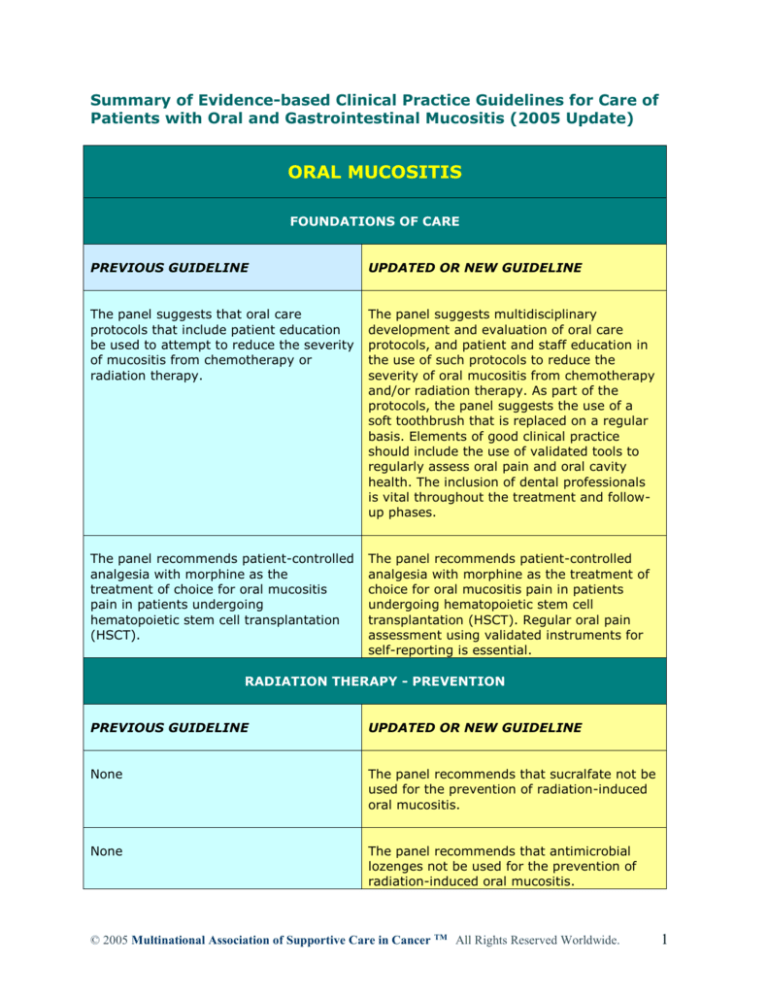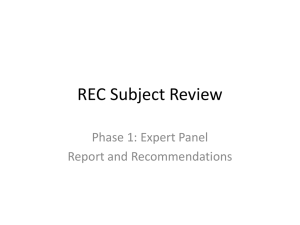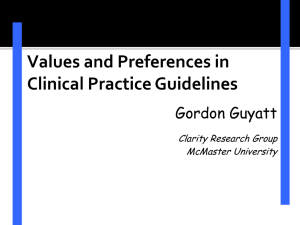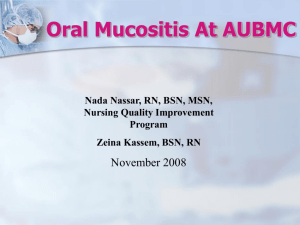
Summary of Evidence-based Clinical Practice Guidelines for Care of
Patients with Oral and Gastrointestinal Mucositis (2005 Update)
ORAL MUCOSITIS
FOUNDATIONS OF CARE
PREVIOUS GUIDELINE
UPDATED OR NEW GUIDELINE
The panel suggests that oral care
protocols that include patient education
be used to attempt to reduce the severity
of mucositis from chemotherapy or
radiation therapy.
The panel suggests multidisciplinary
development and evaluation of oral care
protocols, and patient and staff education in
the use of such protocols to reduce the
severity of oral mucositis from chemotherapy
and/or radiation therapy. As part of the
protocols, the panel suggests the use of a
soft toothbrush that is replaced on a regular
basis. Elements of good clinical practice
should include the use of validated tools to
regularly assess oral pain and oral cavity
health. The inclusion of dental professionals
is vital throughout the treatment and followup phases.
The panel recommends patient-controlled
analgesia with morphine as the
treatment of choice for oral mucositis
pain in patients undergoing
hematopoietic stem cell transplantation
(HSCT).
The panel recommends patient-controlled
analgesia with morphine as the treatment of
choice for oral mucositis pain in patients
undergoing hematopoietic stem cell
transplantation (HSCT). Regular oral pain
assessment using validated instruments for
self-reporting is essential.
RADIATION THERAPY - PREVENTION
PREVIOUS GUIDELINE
UPDATED OR NEW GUIDELINE
None
The panel recommends that sucralfate not be
used for the prevention of radiation-induced
oral mucositis.
None
The panel recommends that antimicrobial
lozenges not be used for the prevention of
radiation-induced oral mucositis.
© 2005 Multinational Association of Supportive Care in Cancer TM All Rights Reserved Worldwide.
1
The panel recommends the use of
midline radiation blocks and three
dimensional radiation treatment to
reduce mucosal injury.
No change
The panel recommends benzydamine for
prevention of radiation-induced mucositis
in patients with head and neck cancer
receiving moderate-dose radiation
therapy.
No change
The panel recommends that
chlorhexidine not be used to prevent oral
mucositis in patients with solid tumors of
the head and neck who are undergoing
radiotherapy.
No change
STANDARD-DOSE CHEMOTHERAPY—PREVENTION
PREVIOUS GUIDELINE
UPDATED OR NEW GUIDELINE
The panel recommends that patients
receiving bolus 5-fluorouracil (5-FU)
chemotherapy undergo 30 minutes of
oral cryotherapy to prevent oral
mucositis.
The panel suggests that 20 to 30 minutes
of oral cryotherapy be used to attempt to
decrease mucositis in patients treated
with bolus doses of edatrexate.
No change
The panel recommends that acyclovir
and its analogues not be used routinely
to prevent mucositis.
No change
STANDARD-DOSE CHEMOTHERAPY—TREATMENT
PREVIOUS GUIDELINE
UPDATED OR NEW GUIDELINE
The panel recommends that
chlorhexidine not be used to treat
established oral mucositis.
No change
© 2005 Multinational Association of Supportive Care in Cancer TM All Rights Reserved Worldwide.
2
HIGH-DOSE CHEMOTHERAPY WITH OR WITHOUT TOTAL BODY IRRADIATION
PLUS HEMATOPOIETIC CELL TRANSPLANTATION—PREVENTION
PREVIOUS GUIDELINE
UPDATED OR NEW GUIDELINE
None
In patients with hematological malignancies
receiving high dose chemotherapy and total
body irradiation with autologous stem cell
transplant, the panel recommends the use of
Keratinocyte Growth Factor-1 (Palifermin) in
a dose of 60 µg/kg/day for 3 days prior to
conditioning treatment and for 3 days posttransplant for the prevention of oral
mucositis.
None
The panel suggests the use of cryotherapy to
prevent oral mucositis in patients receiving
high-dose melphalan.
The panel does not recommend the use
of pentoxifylline to prevent mucositis in
patients undergoing HSCT.
No change
None
The panel suggests that GM-CSF
mouthwashes not be used for the prevention
of oral mucositis in patients undergoing
hematopoietic stem cell transplantation.
Low-level laser therapy (LLLT) requires
expensive equipment and specialized
training. Because of interoperator
variability, clinical trials are difficult to
conduct, and their results are difficult to
compare; nevertheless, the panel is
encouraged by the accumulating
evidence in support of LLLT. The panel
suggests that, for centers able to support
the necessary technology and training,
LLLT be used to attempt to reduce the
incidence of oral mucositis and its
associated pain in patients receiving
high-dose chemotherapy or
chemoradiotherapy before HSCT.
No change
© 2005 Multinational Association of Supportive Care in Cancer TM All Rights Reserved Worldwide.
3
GASTROINTESTINAL MUCOSITIS
BASIC BOWEL CARE AND GOOD CLINICAL PRACTICES
PREVIOUS GUIDELINE
UPDATED OR NEW GUIDELINE
None
The panel suggests that basic bowel care
should include the maintenance of adequate
hydration, and that consideration should be
given to the potential for transient lactose
intolerance and the presence of bacterial
pathogens.
RADIATION THERAPY—PREVENTION
PREVIOUS GUIDELINE
UPDATED OR NEW GUIDELINE
None
It is suggested that amifostine in a dose of at
least 340 mg/m2 may prevent radiation
proctitis in those receiving standard dose RT
for rectal cancer.
The panel suggests that 500 mg
sulfasalazine orally twice daily be used to
help reduce the incidence and severity of
radiation-induced enteropathy in patients
receiving external beam radiotherapy to
the pelvis.
No change
Oral sucralfate does not prevent acute
diarrhea in patients with pelvic
malignancies undergoing external beam
radiotherapy, and compared with placebo
it is associated with more gastrointestinal
side effects, including rectal bleeding;
consequently, the panel recommends
that oral sucralfate not be used.
No change
The panel recommends that 5-amino
salicylic acid and its related compounds
mesalazine and olsalazine not be used to
prevent GI mucositis.
No change
© 2005 Multinational Association of Supportive Care in Cancer TM All Rights Reserved Worldwide.
4
RADIATION THERAPY—TREATMENT
PREVIOUS GUIDELINE
UPDATED OR NEW GUIDELINE
The panel suggests that sucralfate
enemas be used to help manage chronic
radiation-induced proctitis inpatients who
have rectal bleeding.
No change
STANDARD-DOSE AND HIGH-DOSE CHEMOTHERAPY—PREVENTION
PREVIOUS GUIDELINE
UPDATED OR NEW GUIDELINE
The panel recommends either ranitidine
or omeprazole for the prevention of
epigastric pain following treatment with
cyclophosphamide, methotrexate, and
5FU or treatment with 5FU with or
without folinic acid chemotherapy.
No change
None
The panel recommends that systemic
glutamine not be used for the prevention of
GI mucositis.
STANDARD-DOSE AND HIGH-DOSE CHEMOTHERAPY—TREATMENT
PREVIOUS GUIDELINE
UPDATED OR NEW GUIDELINE
When loperamide fails to control diarrhea
induced by standard-dose or high-dose
chemotherapy associated with HSCT, the
panel recommends octreotide at a dose
of at least 100 µg subcutaneously twice
daily.
No change
© 2005 Multinational Association of Supportive Care in Cancer TM All Rights Reserved Worldwide.
5
COMBINED CHEMOTHERAPY AND RADIATION THERAPY—PREVENTION
PREVIOUS GUIDELINE
UPDATED OR NEW GUIDELINE
The panel suggests that amifostine be
used to reduce esophagitis induced by
concomitant chemotherapy and
radiotherapy in patients with non–small
cell lung cancer.
No Change
© 2005 Multinational Association of Supportive Care in Cancer TM All Rights Reserved Worldwide.
6









